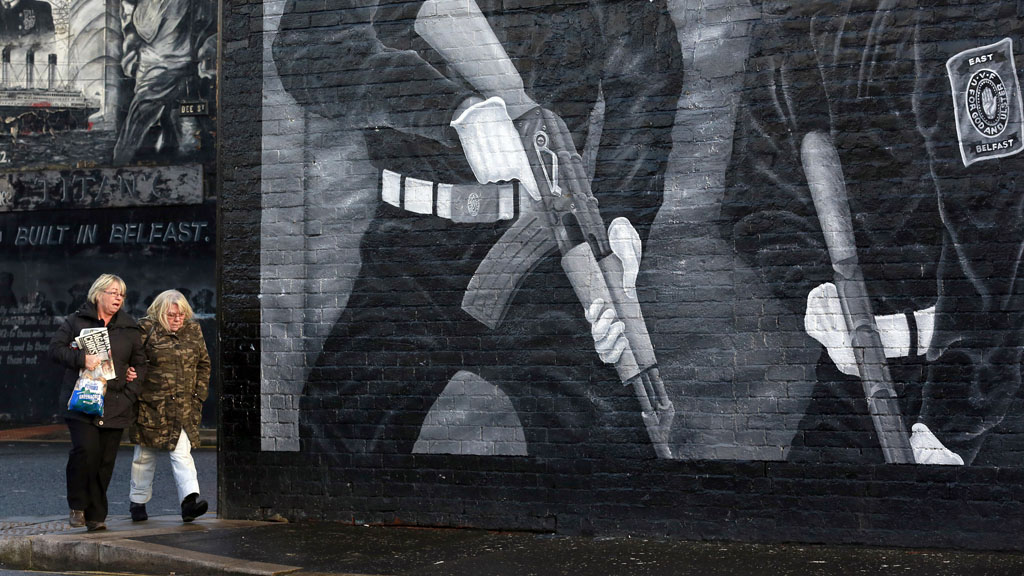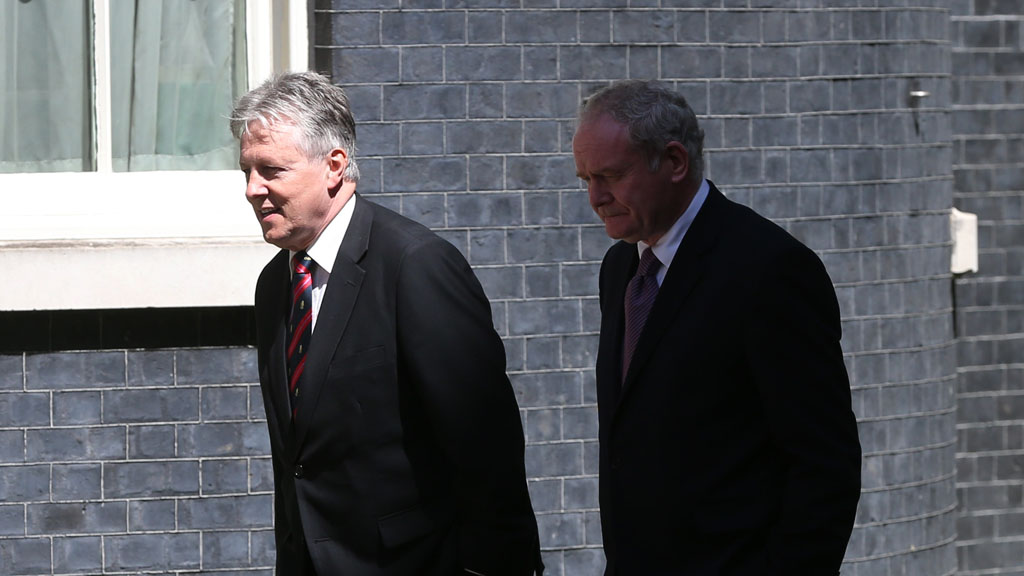Northern Ireland’s ‘secret’ letters: the key questions
A murky deal that undermined justice, or a vital part of the peace process? How can one short letter lead to the collapse of a major trial and threaten the future of Northern Ireland?

Northern Ireland’s first minister, Peter Robinson, has threatened to resign after it emerged that the British government wrote to more than 180 republican terror suspects to assure them they would not be prosecuted.
Peter Robinson says he was kept in the dark over the deal between Tony Blair’s government and Sinn Fein which saw so-called “on the runs” given the letters, and is demanding a public inquiry.
The crisis comes after suspect John Downey was told he would not face trial over the IRA bombing of Hyde Park in 1982, because he had one of the letters.
The row has led to widespread anger in Northern Ireland and beyond, and threatens to bring down the province’s power-sharing administration.
What happened in Hyde Park?
On JUly 20 the Provisional IRA detonated a nail bomb in the boot of a blue Morris Marina parked on South Carriage Drive in Hyde Park, central London.
The blast killed four members of the Household Cavalry who were on ceremonial duty in the park: Roy Bright, Anthony Daly, Simon Tipper and Jeffrey Young.
A separate bomb placed under a bandstand in Regent’s Park went off two hours later, killing seven military bandsmen from the Royal Green Jackets.
More than 20 civilians were injured in Hyde Park and seven horses died in the explosion.
In 1987 Gilbert “Danny” McNamee was convicted of conspiring to cause explosions and sentenced to 25 years. He was released after serving 12 years under the Good Friday Agreement in 1998 and judges later ruled his conviction had been unsafe.
British police said the fingerprints of John Anthony Downey, a convicted IRA member, had been found on parking tickets dispensed when the Marina was left in two NCP car parks shortly before the terror attack.

Why did the case against Downey collapse?
Downey, now 62, and living in Donegal in the Republic of Ireland, has always protested his innocence.
In 2007 he received a letter from the British government which stated that the UK authorities were no longer seeking to prosecute him.
The Secretary of State for Northern Ireland has been informed by the Attorney General that on the basis of the information currently available, there is no outstanding direction for prosecution in Northern Ireland, there are no warrants in existence nor are you wanted in Northern Ireland for arrest, questioning or charge by the police. The Police Service of Northern Ireland are not aware of any interest in you from any other police force in the United Kingdom. If any other outstanding offence or offences came to light, or if any request for extradition were to be received, these would have to be dealt with in the usual way.
In May 2013 Downey was arrested at Gatwick Airport en route to Greece. He was subsequently charged over the murder of four British soldiers and with causing an explosion and was due to stand trial at the Old Bailey.
Downey said he was surprised at the arrest since he had travelled to the UK several times since receiving the letter.
But this week Mr Justice Sweeney threw out the case, accepting defence sumissions that the trial would be an “abuse of process”.
It emerged that the Police Service of Northern Ireland (PSNI) made what David Cameron described as a “dreadful mistake”.
Despite the text of the letter, the force did know that Downey was still wanted by police on the mainland, but still sent him the letter of assurance in error.
The judge said the public interest in prosecuting Downey was “very significantly outweighed” by the need to hold “officials of the state to promises they have made in the full understanding of what is involved in the bargain”.
Why were the letters written?
The Good Friday Agreement granted early release to many republican and loyalist prisoners convicted of paramilitary crimes.
But the status of the “on the runs” remained ambiguous. These were suspects who feared arrest for offences carried out before the 1998 agreement, or who had escaped from custody after being charged or convicted.
The Old Bailey heard that 187 such letters had been sent to suspects, all of them nominated by Sinn Fein, following a deal struck by Tony Blair’s government with the republican party.
The issue was felt at the time to be a sticking point in the negotiations with Sinn Fein over the decommissioning of IRA weapons.
Former Northern Ireland minister Peter Hain said: “This was a critical part of the peace deal that has brought Northern Ireland from horror and evil to peace and hope and the idea that it could be unravelled in his (Downey’s) case was astonishing to me.”
The Labour government tried to find a legislative solution to the outstanding problem of “on-the-runs” in 2005, but a new law was rejected by all sides. The “administrative process” of sending letters continued.
The Conservative Attorney General Dominic Grieve, who made the decision to charge Downey, said 38 of the 187 letters have been sent since the coalition came to power in 2010.
Was there an amnesty?
The letters do not in themselves grant immunity from prosecution.
But Mr Robinson has alleged that royal powers had also been used to pardon convicted republicans.
He said: “It appears that we are not just dealing with ‘on the runs’ who received letters, but we are also dealing with people who received the Royal Prerogative of Mercy, that indicates there were offences involved.
“So we are not talking just about people who it is believed that the police did not have sufficient evidence to make a prosecution stick – that makes it a very serious matter.”

Did Peter Robinson know about the deal?
He says not. But Jonathan Powell, the civil servant who acted as Tony Blair’s chief negotiator in Northern Ireland, suggests Mr Robinson and his Democratic Unionist Party deputy Nigel Dodds were aware of horse-trading around the issue of “on-the-runs” (OTRs).
In his book Great Hatred, Little Room: Making Peace in Northern Ireland, Mr Powell wrote that Mr Robinson and Mr Dodds “said they could accept the implementation of the unpopular undertakings we had made under the Joint Declaration on OTRs as long as Tony (Blair) wrote to (Ian) Paisley making it clear that these concessions had been agreed during David Trimble’s watch, not theirs.”
Mr Robinson has dismissed this as inaccurate while Lord Trimble, ex-leader of the Ulster Unionist Party and a former first minister of Northern Ireland, has also denied all knowledge of the letters.
It has emerged that a senior PSNI officer briefed the Northern Ireland Policing Board on elements of the scheme in 2010. DUP members were present at the meeting, although the letters were not mentioned.
The issue was also raised in the 2009 Eames-Bradley report on the legacy of the Troubles.
Sinn Fein Deputy First Minister Martin McGuinness said today: “I think that the angst among unionist politicians is more centred around the common belief out there in society and in the media that they knew all about this.
“They may not have known about the letters, but they knew about the scheme and they knew that these people who were described as on-the-runs were being processed.”
What happens now?
Mr Robinson is set to hold talks with the Northern Ireland secretary, Theresa Villiers, at Stormont after effectively giving the Government 24 hours to respond to his demand for a public inquiry in to the letters.
He is due to put a motion before the Northern Ireland assembly on Friday and has said it will depend on the government’s response.
Mr Robinson’s resignation would spell the end of the coalition executive and would trigger elections.
The prime minister, David Cameron, announced at at press conference on Thursday that an independent judge will be appointed to “produce a full public account of the operation of this administrative scheme, to determine whether any other letters were sent in error”.